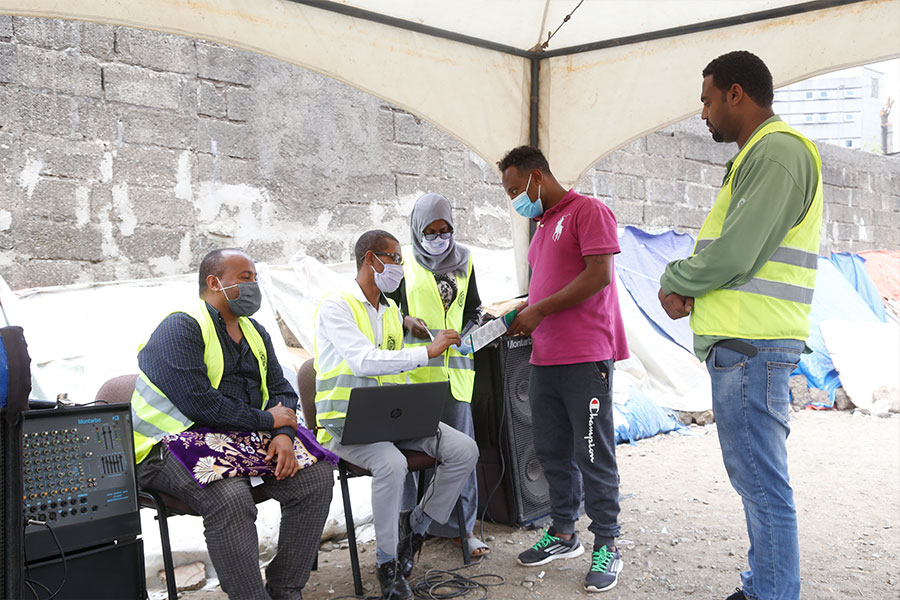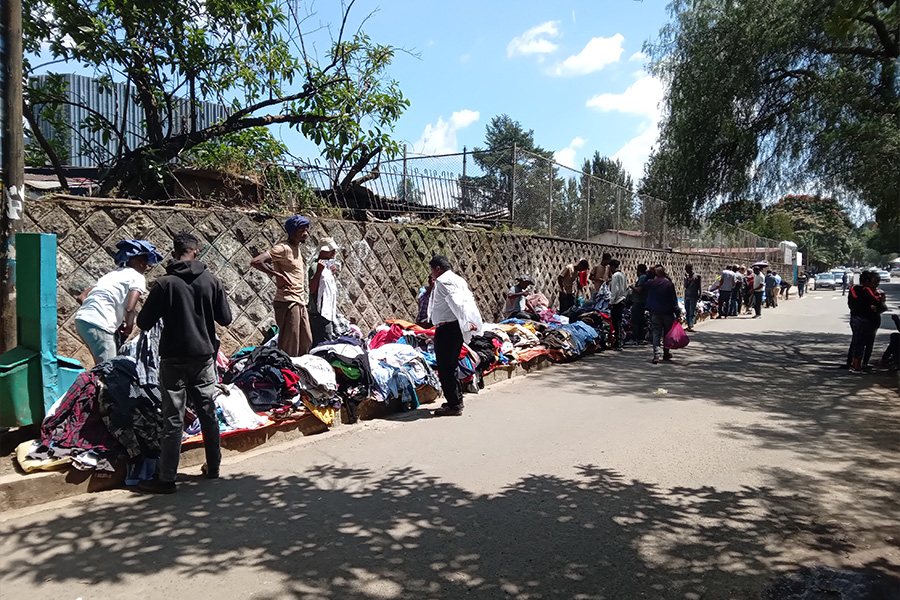
Editorial | Aug 18,2024
A myriad of loud sounds are competing to be heard over one another in Mercato, the largest open-air market on the continent. Multiple speakers blare announcements and advertisements vying for the attention of passersby in the area known as Dubai Tera, named after the place where most of the clothing items on sale are allegedly imported from. One of those speakers is leaning on the side of a small grey minivan doubling as a pesticide shop.
A man's voice is loudly announcing to anyone within a 200m radius about the effectiveness of the sprays on display, guaranteeing their toxicity to cockroaches.
Perhaps another common and distinct noise in the area is that of the prize raffle organisers. They move around from one part of the market to the other shaking their plastic box full of chips to draw attention and register interested people. Ticket prices vary from one market to another, but a lucky winner takes it all, leaving a percentage to the organisers.
There are more than a few shoppers here making their way from one store to the other but are nowhere near the crowds deserving of a time like Christmas eve. At least that is what Ismael Yusuf, a shoe store owner, has noticed. His shop, where he sells men's shoes exclusively, is wedged in between a couple of similar stores.
His business has not been the same since the onset of the Novel Coronavirus (COVID-19) pandemic in the country, but this holiday is especially slow, according to him.
"There would be no time to stand around and talk about how there's no work [in previous holiday markets]," he said. "I would be running from one customer to another."
As holidays roll around, there is a big spike in sales for businesses like his which sell shoes as well as clothes. Ismael himself used to sell up to 10 pairs of shoes a day leading up to the week before the holiday. But today he has yet to sell a single pair.
"People are more concerned about buying food now," he said. "Clothes aren't a priority."
The forex crunch, which as of late has been severe, has also been felt here as importers raise prices based on availability. In the past month, retailers in Mercato state that this had been especially unpredictable and that it has been a source complaints to distributors and the retailers who then receive their products from them.
In Shola market near Megenagna, vendors mostly without face masks sell butter and honey by the kilogram on Christmas eve.
But it is not just businesses like Ismael's, non-essential and first to be crossed off from many a shopper's list, that have not had many buyers this Christmas.
Addisu Gebeya, another market in the city where herds of sheep and goats occupied the greater portions of the sidewalks, are being sold for prices that have not changed much over these few months. Sheep are being sold at a little over 3,000 Br, at least the ones that are considered medium-sized. Anything bigger than that and the price goes up to 4,500 Br. But the vendors here, some of whom have come all the way from Arsi Negele, Oromia Regional State, are unhappy with the turnout.
"Addis Abeba isn't what it used to be," said one vendor who made the over four-hour drive from the town. "Everyone says they don't have money and that the sheep are too expensive."
The prices for sheep seem to have remained at relatively similar levels since New Year's, the last major holiday, while the same cannot be said for the inflation figures in the country. Last month, the headline inflation, the total inflation present in an economy, stood at 18.2pc, 0.8 percentage points down from the month before.
Food inflation reached 21.3pc and non-food inflation came in at 14.3pc, 1.1 and 0.8 percentage points down, respectively, according to the Central Statistical Agency.
But economists state that everyone must look beyond these numbers, which can often be misleading.
Most of the widely used goods in the country are food items grown in the country and hence are seasonal, explains Martha Kibru, an economist and lecturer at Addis Abeba University.
"This is a time of harvest, so it's not surprising that there is higher supply," she said. "But comparing the purchasing power of 100 Br now and a year ago is unthinkable."
Despite the lack of buyers, the price of commodities hardly drops to meet the demand, she explained.
In Shola market near Megenagna, chickens, omnipresent in holiday markets, were sold for a similar price a few months ago at around 400 Br. This excludes the "Elfora" chickens as they are known, or those being bred at farms for laying eggs. Those chickens are sold at 200 Br, but a persistent shopper may even get one at 170 Br at one of the many trucks around the city. The trucks are filled with chickens and a designated seller sits atop the car calling out the prices.
Some items, like eggs, had even dropped in price compared to a few months ago and are now going for six Birr each.
Here, like Mercato, things were less than the usual level of busyness during the holiday season. Daniel Girma, a 30-year-old chicken vendor, is a testament to that. He was set and ready to go by 7:30am. Three hours later, he had just sold his first two chickens of the day at the price of 450 Br each.
"The air is dead," said Daniel, who had received 60 chickens from a distributor in Wolaita in the Southern Nations, Nationalities and People's Regional State. "I've barely sold half of them."
It is not the just retailers in the market who have felt this. Organisers of cash raffles in the market also have had to drop their prices for tickets significantly; gambling away money is no longer a luxury the retailers can afford.
Another distinct change in markets these days is mask observance or the lack thereof. General precautions had lulled in comparison to the New Year's holiday market when nearly everyone in the big markets wore face masks. The Addis Abeba Trade Bureau had played a big role in ensuring compliance by vendors along with security personnel at the time. This time around, the attention had shifted to distributing high-demand holiday commodities to the more than 140 consumer cooperative unions.
The idea was to avoid the holiday commotion, source the items early, and deliver them to customers, according to Solomon Bekele, head of the marketing department at the Bureau.
"This ensures that there will be an adequate supply of goods and serves as a precautionary step against the spread of the pandemic," he said.
Ten task forces, each assigned to one of the 10 districts under the City Administration, had started market assessments nearly two weeks preceding the holiday, according to him.
The findings resulted in no extraordinary cases of hoarding or illegal activities and determined the selection of holiday goods to supply the cooperative unions. Teff, onions, eggs, meat and meat products along with the usual sugar and palm oil were distributed. Even oxen made the list this year.
"It was a relatively calm market," said Solomon. "There were no visible price hikes like in the past."
The outbreak of armed conflict in the country's northernmost region, Tigray, is the latest burden on a market that has already been suffering from the economic fallout of the pandemic. The conflict itself may be a recent worry, but other vendors at different centres state that the instability in the country in the past two years has created unpredictability. Road closures due to unrest, specifically, stood out.
Instability in the country can manifest itself through the actions of the interested parties, according to Martha. People and entities with vested interests may cause disruption on purpose, she remarked.
One major change in the past year that has led to market disruptions is the currency exchange, according to her. The aim was to get money through a legal system and formalise it, the domino effect of which created upset elsewhere.
"Whenever the government tries to fix a certain thing, it'll have ripple effects that can destabilise the market," she said. "A good example is government interference in the cement prices a few months ago."
The attempts at controlling the shortage of forex in a primarily informal economy also add to the economic instability, according to her.
"Other reasons that play a role include the pressure the country is facing from other countries as most of the [federal] budget is sourced through loans and grants," she said. "When that is impacted, so is the country's economy."
The impact of inflation, the forex crunch and many other reasons may be cited for the stagnant holiday market, but the effects extend far beyond and are being felt throughout the value chain.
PUBLISHED ON
Jan 09,2021 [ VOL
21 , NO
1080]

Editorial | Aug 18,2024

My Opinion | Sep 26,2021

Radar | Jul 06,2025

Fortune News | Jan 27,2024

Fortune News | Jun 15,2025

Fortune News | May 21,2022

Agenda | Apr 17,2021

In-Picture | Oct 13,2024

Commentaries | Apr 29,2023

Radar | Dec 15,2024

Dec 22 , 2024 . By TIZITA SHEWAFERAW
Charged with transforming colossal state-owned enterprises into modern and competitiv...

Aug 18 , 2024 . By AKSAH ITALO
Although predictable Yonas Zerihun's job in the ride-hailing service is not immune to...

Jul 28 , 2024 . By TIZITA SHEWAFERAW
Unhabitual, perhaps too many, Samuel Gebreyohannes, 38, used to occasionally enjoy a couple of beers at breakfast. However, he recently swit...

Jul 13 , 2024 . By AKSAH ITALO
Investors who rely on tractors, trucks, and field vehicles for commuting, transporting commodities, and f...

Oct 25 , 2025
The regulatory machinery is on overdrive. In only two years, no fewer than 35 new pro...

Oct 18 , 2025
The political establishment, notably the ruling party and its top brass, has become p...

Oct 11 , 2025
Ladislas Farago, a roving Associated Press (AP) correspondent, arrived in Ethiopia in...

Oct 4 , 2025
Eyob Tekalegn (PhD) had been in the Governor's chair for only weeks when, on Septembe...